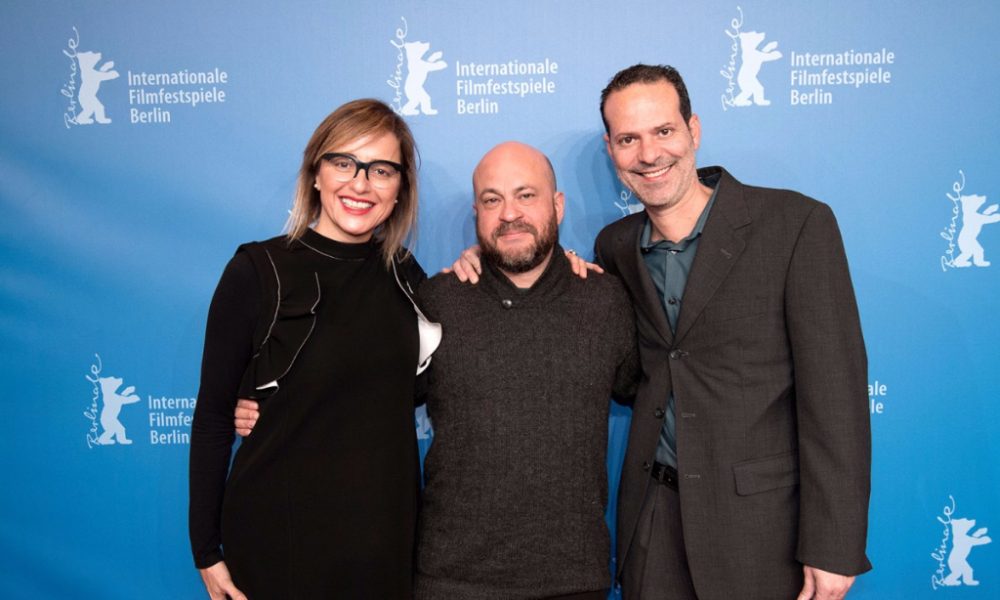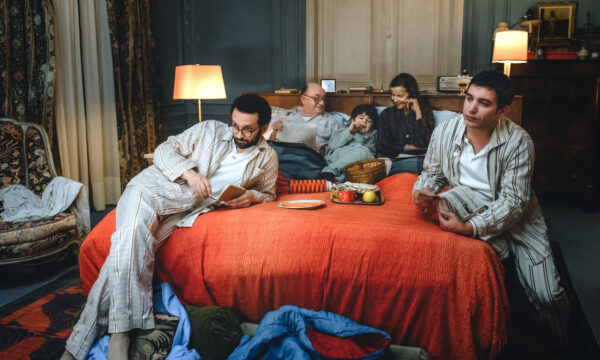La Libertad del Diablo (Devil’s Freedom): An interview with director Everardo González

La Libertad del Diablo is the haunting new documentary from Everardo González, investigating drug-related disappearances in Mexico – a phenomenon that’s claimed the lives of over 10,000 people in the last five years. Based on personal testimony from both victims and perpetrators, the viewer is captured by the gaze of those who speak, all of whom are wearing the same flesh-coloured ski mask. The film reveals how grief, fear and uncertainty have permeated the fabric of Mexican society, and presents to us the chilling stories behind the statistics. We spoke to Everardo to discuss the healing power of testimony, the international causes of disappearances, and why building walls – whether real or metaphorical – will not help the problem.
Over the years you have tackled a few different hard-hitting topics in Mexico, from criminal gangs to droughts. Why have chosen disappearances this time?
It’s mostly because of fear, and the effect it can have on society – it can create hate. There’s an era we have now in Mexico, which is kind of a post war, so it’s the right time for me to ask questions about what happens in those days, in people’s minds. Everything started maybe in 2012, when they started talking about the concept of “collateral damage”, and they referred as collateral damage all the civil victims of violence. So for me it was a little bit nasty to only refer to the families of the disappeared, those who were separated or disintegrated, as collateral damage.
That’s why I decided to make this film, I wanted to at least know the point of view of those who will be prosecuted for violence, for committing crimes or murdering and assassinations. I was concerned about how could I make them feel free, in order to speak. And so that’s why I started to think about using a mask, because it helped them, not necessarily in terms of anonymous things, but because it gave them freedom of speech. It allowed them to be more comfortable with the things they were saying.
This mask is a powerful symbol in the film, and everyone you speak to – from army deserters, gang members, police officers to the children of the disappeared – are all wearing the same one. What was your reasoning for this? Was it to stress, as you say in the opening credits, that we are “all still part of the same species”?
Yeah, because in a way, it’s the only way to integrate them, that mask, it’s like a skull. I wanted to see how the mask takes on the personality of everyone who is wearing it. So that’s why it has this particular material, you can see it gets wet and sweaty. I wanted, for a moment at least, for people to forget that the one who is talking is a murderer. Because in my opinion, he is also a victim as well. So, in my opinion it is a film about victims.
Do you feel like you will be in danger back in Mexico, for making this film?
Well, that’s why it’s so important to be in the ring: when a film has a focus, a spotlight, it protects all the crew, in a way. We are Mexicans, we are not foreigners who come to Mexico to make a film, we all live there. It is a bit dangerous of course, but we work with CPJ protocols of journalism, so I think we took care of a few things in order to feel safe.
How did you find the people you spoke to, did they personally come to you?
No they didn’t come to me, I found them over five years of research with a lot of people helping. Some of them were journalists, some of them human right watchers, some of them lawyers, some of them ex-gang members too. So there was a whole crew working for the research of this film, coordinated by Daniela Rea, a Mexican journalist herself.
So yeah, we were looking for them. Some of them live in Mexico, some of them were exiled outside of Mexico and hiding from the army or hiding from the police or hiding from the cartels because you never know who is after you. It could be the cartels, the police or the army, you could be hiding outside of the country, so we came through their lawyers for example.
A very moving moment in the film was when the man who had been raped and tortured by police admitted you were the first person he had shared this with. Do you think that giving testimony and speaking about these events is healing for them?
Always. And we not only used a mask, but a mirror as well, so they were watching their own reflection while they were talking. In a way it’s a sort of self-confession, and I think it’s always healing to talk about these things. That’s why these sorts of films are important, especially in the countries where the problems are, because it’s important to talk about these things. Not only as a note in the newspaper, or a note in the news, but as an approach from the emotions and the psychological damage it causes, and what is happening with societies.
It was shot in Mexico and it talks about Mexican problems, but it’s not that far from what’s going on in Palestine, or The Congo, or Rwanda, or Paris, or LA, or Florida, or El Salvador. Hate and fear is something that happens everywhere. Using fear for political reasons and controlling societies is something that happens all over the world.
It’s a complex situation, and often the police are involved in the disappearances, so what do you think can be done to help?
I think the only way these things change is for there to be a huge change in the political economy and the way economy is running the world. That is a huge problem. I don’t know if you remember this kid in the film who got an Audi A3 as a gift for his first kill. That car is the reason for everything. So if the economy doesn’t change, there will be always a kid chasing that car, chasing the power and wishing to have what we have.
So that’s the main problem, and it’s OK if you put better police officers and better armies, but the US will keep on sending guns, we will keep on sending them the cocaine. So it’s a world trade thing – it’s just like moving carrots or tomatoes. (Laughs)
And this leads me to one of my last questions, what do you think of Trump’s wall? A lot of the disappearances happen near the border, how do you think it will affect the situation?
Well we already have a border, we already have a wall! People who live in the borders, they know there’s already a wall. So, for me, it’s only speech, or metaphor, because we have a wall. It won’t stop anything. They have a lot of noses over there in the US, they will keep on sniffing and sniffing. And they have a lot of wackos who come back from wars who need heroin or need morphine – and we have providers of heroin. So the wall won’t change anything, it’s just like a crisis speech. I don’t know why we are so worried because he’s planning to build a wall that is already there.
Maybe the problem is that it is a metaphor, and the wall will be applied to everyone. A bigger wall was put into the seven countries that he didn’t allow to get in the US; the court said no but his intentions were even bigger than a wall. So maybe it’s a metaphor, not only for Mexicans but for the rest of the world too.
It’s quite worrying.
Exactly. But the only thing is that we will all be worried by the same guy.
Yes everyone has a clear enemy to focus on.
Exactly
Towards the end of the film, the guy who was given an Audi for his first kill says that he wants to be forgiven for his crimes. And I was quite shocked when that little girl says she would like to kill them. So what do you think, do they deserve forgiveness?
I don’t know. But I think that is a discussion that we must have in Mexico, soon. Because of what happened in Colombia, they [FARC] asked for forgiveness and the people voted no. They had a referendum with them and everything. But that’s how you finish wars. For example, in El Salvador, they had a peace treaty that was signed in Mexico, the treaty was to forgive all the perpetrators. Because we can’t put everyone in jail, we don’t have enough space for them. And what would happen to the country!
So in a way, it’s something that we must start discussing or at least guessing and wondering. Because if you see, what would happen with this kid, even though you can justify her or not, saying she could become a criminal. It puts her on the same side. So it’s difficult and that is why the death penalty is so slippery.
And there was this man who was torturing the torturers, he said it was better to kill them.
Exactly, it gets confusing, the idea of justice is all mixed up. That’s what wars provide, lack of confusion and order. Hate.
Is the film going to be screened in Mexico?
Yes it will be screened in Mexico on 12th March.
Finally, what do you hope the film will achieve?
Open discussion, a bit. For me, it was very important to listen to what the perpetrators have to say about the situation, because no one asked them, ever. So for me it was important to give them a voice – that everyone at least can give their opinion. And they must realise that we are all part of it. Germany as well. The European community as well. Because in ten years of massacres in Mexico, more than 400,000 people have been directly affected by war. But the European community have said nothing about it, the United nations have said nothing about it. So, maybe Trump is helping a bit to make the world look at Mexico. It’s not only beaches and sand, Cancun and music. All those things are Mexico as well, but now is a moment where we must think about other countries again.
Jayne Rosanna Phillips
Read our review of La Libertad del Diablo here.
For further information about the 67th Berlin Film Festival visit here.
Read more reviews from the festival here.
Watch the trailer for La Libertad del Diablo (Devil’s Freedom) here:





















Facebook
Twitter
Instagram
YouTube
RSS